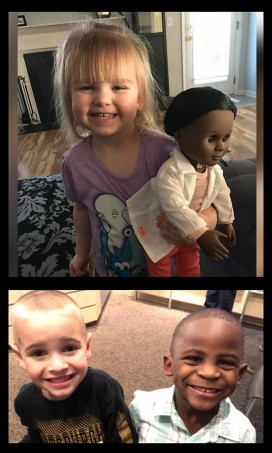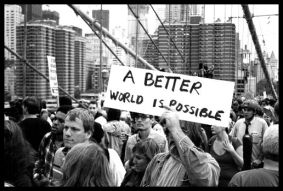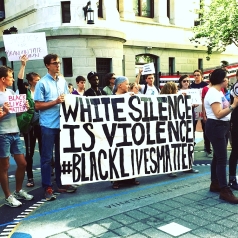by Michelle Palmer
Not long ago a story went viral about a little girl named Sophia, who went to Target with her mom to pick out a prize for learning to potty. She picked out a doll who was a doctor. The girl was white, and the doll was black. The cashier asked the little girl if she wanted to pick out a different doll because that doll didn’t look like her. But the little girl said, “Yes, she does. She’s a doctor like I’m a doctor. And I’m a pretty girl and she’s a pretty girl. See her pretty hair? And see her stethoscope?”
 The USA Today article I used to get the exact wording said this, “This account of a ‘color blind’ [sic] kid reminds us of Lydia Rosebush’s son, [Jax] who in February wanted to shave his head to look like his African American friend [Reddy].” (You may have seen that story too.) Both moms who shared these interactions had similar takeaways:
The USA Today article I used to get the exact wording said this, “This account of a ‘color blind’ [sic] kid reminds us of Lydia Rosebush’s son, [Jax] who in February wanted to shave his head to look like his African American friend [Reddy].” (You may have seen that story too.) Both moms who shared these interactions had similar takeaways:
- “This experience just confirmed my belief that we aren’t born with the idea that color matters. Skin comes in different colors just like hair and eyes and every shade is beautiful.”
- “If this isn’t proof that hate and prejudice is something that is taught I don’t know what is.”
My first reaction to both of these stories was to be all heart-melty and happy. But within a minute or so, I sort of got uneasy. The beauty of these stories is that these kids aren’t seeing skin color as something that determines a substantive difference or decreased value to a person. That’s wonderful and beautiful and a good lesson for them at their ages and level of understanding. But the problem is that we, as adults, act as if these stories reveal to us that color blindness is the way forward. We praise them as if they are the pinnacle of racial understanding. But it just doesn’t work that way. Because while Sophia’s mom is half-right and every shade of skin really is beautiful, in our world, color does matter.
Systemic Racism & White Privilege
In short, the heartbreaking reality is that Reddy will have a different experience of life than Jax will. I like to assume that all of our readers are “woke,” aware that both systemic racism and white privilege are very real. But, if I’m wrong, or if y’all just need a refresher, here are some basics:
- Black children are much more likely to go to low-income, underfunded schools than white children.
- “…whites with the exact same résumés as their black counterparts are hired at double the rate.”

- “A black person with the same education and experience as a similar Caucasian, over the span of their lives, will earn significantly less.”
- “It is a little-known fact that the average black person pays more for almost every item he or she purchases.”
- “According to Unlocking America, if African American and Hispanics were incarcerated at the same rates of whites, today’s prison and jail populations would decline by approximately 50%.”
- “5 times as many Whites are using drugs as African Americans, yet African Americans are sent to prison for drug offenses at 10 times the rate of Whites.”
(Sources for these stats can be found here and here.)
 To further illustrate the issue, I want to point to an excellent piece I found while researching for this post. Bitsy Bentley wrote this incredibly honest account of her experiences in owning up to her own internal racism, which by the way, we all have. I encourage you read the whole thing here, A White Woman Confronts Her Racism, but I think this excerpt gets to the heart of the matter: “Unconscious bias turns our streets into a dangerous place for black and brown people in our communities, and conflating order with safety is part of the problem. I’d like to see white people change the way we talk about policing in our communities — we need to put safety ahead of order and hold our elected officials accountable for recognizing and dismantling the systemic bias that holds black people in fear.”
To further illustrate the issue, I want to point to an excellent piece I found while researching for this post. Bitsy Bentley wrote this incredibly honest account of her experiences in owning up to her own internal racism, which by the way, we all have. I encourage you read the whole thing here, A White Woman Confronts Her Racism, but I think this excerpt gets to the heart of the matter: “Unconscious bias turns our streets into a dangerous place for black and brown people in our communities, and conflating order with safety is part of the problem. I’d like to see white people change the way we talk about policing in our communities — we need to put safety ahead of order and hold our elected officials accountable for recognizing and dismantling the systemic bias that holds black people in fear.”
Pursuing color blindness, ignoring racial realities, and refusing to stand up against racial injustices and oppression quite literally undermines the safety and wellbeing of people of color in our communities. We all have biases that we must proactively fight, and pretending they don’t exist won’t solve anything.
So, what do we do about it?
I will add a few “how to be an ally” articles to the For More Information… section of the post. But I want to focus our attention on the next generation, on the Sophias and Jaxes of the world. I wrote this particular post this week because of a conversation I had on Saturday. I was with a good friend I hadn’t seen for  ages, and we were talking about Tuesday Justice, and she told me about some of the discussions she’s had with her husband about how they will talk to their son about race. He’s only 9 months now, but it won’t be long until he, like Jax and Sophia, begins to interact with the world around him. As his parents, they want him to respect and value people of all races equally, but they also want him to understand the responsibility that comes with his privilege.
ages, and we were talking about Tuesday Justice, and she told me about some of the discussions she’s had with her husband about how they will talk to their son about race. He’s only 9 months now, but it won’t be long until he, like Jax and Sophia, begins to interact with the world around him. As his parents, they want him to respect and value people of all races equally, but they also want him to understand the responsibility that comes with his privilege.
I’m not sure I would’ve known where to begin without this article by Ali Michael and Eleonora Bartoli, What White Children Need to Know About Race. Again, I encourage you to read the whole thing, but here is the most relevant part:
“In particular, the research suggests that for fear of perpetuating racial misunderstandings, being seen as a racist, making children feel badly, or simply not knowing what to say, many white parents tend to believe that there is never a right time to initiate a conversation about race. They talk to their children about race if it becomes relevant in their lives (mostly in negative contexts). Otherwise, they tell their children that people are all the same and that they should not see race.
 “While white parents’ intention is to convey to their children the belief that race shouldn’t matter, the message their children receive is that race, in fact, doesn’t matter. The intent and aim are noble, but in order for race not to matter in the long run, we have to acknowledge that, currently, it does matter a great deal. If white parents want their children to contribute to what researchers Matthew Desmond and Mustafa Emirbayer describe as a ‘racially just America’ in which race does not unjustly influence one’s life opportunities, their children will need to learn awareness and skills that they cannot acquire through silence and omission.”
“While white parents’ intention is to convey to their children the belief that race shouldn’t matter, the message their children receive is that race, in fact, doesn’t matter. The intent and aim are noble, but in order for race not to matter in the long run, we have to acknowledge that, currently, it does matter a great deal. If white parents want their children to contribute to what researchers Matthew Desmond and Mustafa Emirbayer describe as a ‘racially just America’ in which race does not unjustly influence one’s life opportunities, their children will need to learn awareness and skills that they cannot acquire through silence and omission.”
The authors go on to provide a list of content knowledge and skills that we need to develop and help our children to develop as we move forward.
- Content Knowledge:
- Be clear about the meaning of “race.”
- Understand systemic racism.
- Learn how anti-racist action is relevant to all.
- Understand stereotypes and their counter-narratives.
- Skils:
- Develop self-awareness about racist beliefs.
- Analyze media critically.
- Learn how to intervene.
- Manage racial stress.
- Develop authentic relationships with peers of color.
- Recognize one’s racist and anti-racist identities.
“One-dimensional, generic teachings are tempting. They feel easier and safer. […] But raising children who are resilient for justice and able to do their part to create an inclusive society takes more, especially now. And it’s not as hard as it might seem.”
from Are We Raising Racists? By Jennifer Harvey
While we should absolutely teach children that no skin color is more valuable, that our commonalities are greater than our melanin, that we are all in this together, we mustn’t ignore the very real differences in our experiences. For the sake of future generations, we cannot sweep racial disparities under the rug by pretending we “don’t see color.” Yes, it’s complicated, but for the sake of racial reconciliation and justice, it’s worth it.
For more information….
-
“Your 5-year-old is already racially biased. Here’s what you can do about it.”
- Yes, You Can Measure White Privilege by Michael Harriot.
- NAACP Criminal Justice Fact Sheet
- Previous Tuesday Justice Post – Companion to the Film, 13th (Includes lots of resources regarding racial disparities in the justice system.)
- The Sugarcoated Language of White Fragility by Anna Kegler
- 5 Initial Ways You Can Be a Better Ally to People of Color by Savonne Anderson
- 11 Things White People Can Do to Be Real Anti-Racist Allies by Kali Holloway
- White Silence is Violence: How to be a White Accomplice by Corinne Fletcher
- For our Christian readers: Your Theology Won’t Let You Be Colorblind by Elizabeth Behrens
- The Heart of Whiteness: Ijeoma Oluo Interviews Rachel Dolezal, the White Woman Who Identifies as Black by Ijeoma Oluo
- Everyone Pays A Hefty Price For Segregation, Study Says by Nick Chiles, NPR


Funny enough…I ran into this a few hours after I made my own post on racial colorblindness, albeit from a much more personal perspective: https://blindinjusticeblog.wordpress.com/2017/05/16/the-problem-with-being-colorblind/.
Back to your piece though…I really appreciate your piece. Speaking from the perspective of someone who used to believe in colorblind ideology through childhood and even the first part of young adulthood, I think your piece shows why we should not be colorblind, but see how differences in skin color still play a role in injustices that are still around.
LikeLiked by 1 person
Thanks, Brendan! Your post was excellent. Look forward to reading more from you!
LikeLike
[…] natural hair, goes deeper than just the issue of hair. As other posts on this blog have discussed time and time and time and time again, there is deep-rooted systemic racism at play here, even down to […]
LikeLike
[…] Racism in America & The Danger of Color Blindness […]
LikeLike
[…] Michelle’s Favorite Post by herself: “Racism in America and the Danger of Colorblindness” […]
LikeLike
[…] a very public debate between Caesar-Chavannes and Bernier. (Michelle has previously written about the danger of colourblindness in a personal […]
LikeLike
[…] confusion about when something is “racist” is that there has been a pervasive push towards “colorblindness.” It’s led to a world where it can feel awkward to acknowledge a person’s race. Attempting to […]
LikeLike